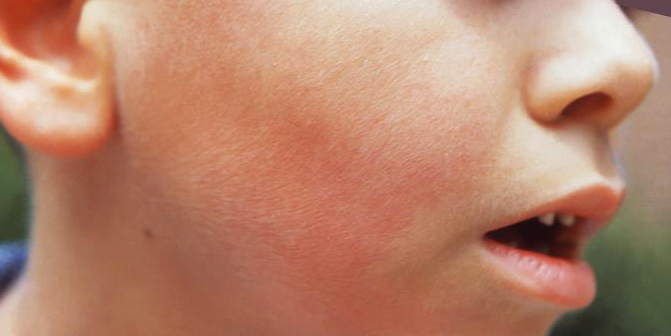September 06, 2024
Learn About Parvovirus B19
The CDC is monitoring increased parvovirus B19 activity in the US. Currently there are no reports of parvovirus in Cambridge.
What is Parvovirus B19?
Parvovirus B19 is a seasonal respiratory virus. It is sometimes called fifth disease.
Symptoms
Parvovirus B19 is usually mild, and most children and adults get better without any problems. Some people have no symptoms and never even feel sick.
If symptoms do develop, the first stage of symptoms of parvovirus B19 includes headache, body ache, sore throat, mild fever, and chills. These symptoms last for two or three days and may be indistinguishable from other viral illnesses.
In the second stage, there are no symptoms at all for up to a week.
In the third stage, children get a bright red rash on their cheeks that can look like slap marks. This “slapped-cheek” rash is sometimes followed by a lace-like rash on their arms and legs. Despite the rash, children generally continue to feel well during this time.

Adults are less likely to have the third-stage rashes but sometimes get swollen and painful joints. Joints are affected on both sides, usually in the hands, feet, and knees. The joint pain usually lasts one to three weeks but can last for months or longer.
Parvovirus B19 is usually mild, and most people get better without any problems.
How is Parvovirus B19 Spread?
It can be spread from person to person through:
- Respiratory particles
- Blood or blood products
- During pregnancy (from mother to baby)
Parvovirus B19 only infects people. Your pets cannot get the virus from humans or give the virus to humans.
People are most contagious during the early part of the infection, when they either have no symptoms or nonspecific flu-like symptoms. By the time they get a rash or joint pains, they are no longer contagious.
Who is at Risk of Complications from Parvovirus B19 Infection?
Parvovirus B19 infection is usually mild for those who are otherwise healthy. Most people get better without any problems. However, for some it can cause serious health complications.
An infection early during pregnancy can cause a slight increase in the risk of a miscarriage.
Parvovirus B19 has also been shown to cause a severe drop in blood count (anemia) in some patients with certain blood disorders or with a weakened immune system.
You may be at increased risk for complications from a parvovirus B19 infection if you have one or more of these health conditions:
- Leukemia or other cancers
- Organ transplant
- HIV infection
- Blood disorders such as sickle cell disease and thalassemia
Diagnosis
Diagnosis is generally based on symptoms but in certain circumstances specialized blood tests may be ordered by the provider.
Treatment
There is currently no treatment that cures a parvovirus B19 infection. Treatment usually involves relieving symptoms, such as fever, itching, and joint pain and swelling.
Please see your healthcare provider if:
- You have complications from a parvovirus B19 infection, or
- You are infected while pregnant. Learn more about parvovirus B19 and pregnancy on the CDC’s website.
Prevention
There is no vaccine that can prevent parvovirus B19 infection. However, the practices below can help stop the spread of all respiratory viruses, including parvovirus B19:
- Wash your hands. Remember to scrub your hands with soap for 20 seconds.
- Cover your mouth and nose with a tissue when you cough or sneeze. Make sure to throw these used tissues out. If you don’t have a tissue, cough or sneeze into your elbow, not your hands.
- Clean surfaces frequently touched by you and others. This includes countertops and doorknobs.
- Create cleaner air around you. This can either mean bringing fresh air inside or purifying indoor air.
- Wear a mask.
- Stay home if you do not feel well.
